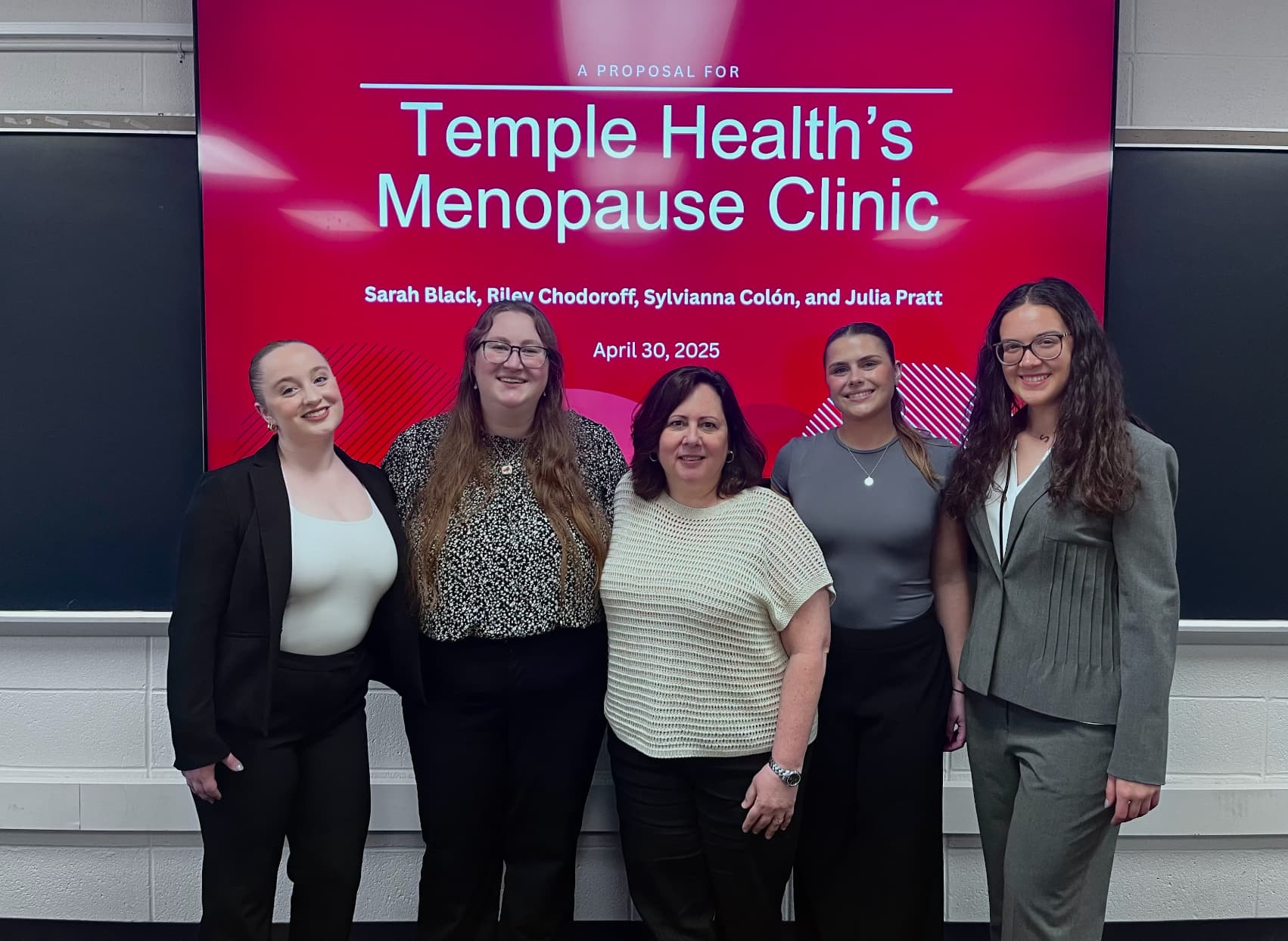Menopause is one of the most under-researched topics in women’s health. According to Tricia Richards-Service, an adjunct professor of public relations, only one in 10 women has had someone discuss it with them. Symptoms can begin at any age, yet because of the stigma surrounding the subject, many don’t even realize menopause may be the cause.
Now, with figures like Halle Berry, Naomi Watts and Oprah Winfrey speaking openly about their experiences, the need for menopause education is entering the spotlight. That’s where Richards-Service and students from this semester’s class of Klein 4111: Interdisciplinary Approach to Communication Campaigns stepped in.
The course brings together students across disciplines to tackle real-world, community-focused challenges. Students work in partnership with Temple Health and the Lewis Katz School of Medicine to address problems that will directly improve the health of neighborhoods surrounding Temple’s campus. Each semester, the class explores a different topic. Deborah Cai, the senior associate dean of Klein College of Media and Communication, and Stefanie Murphy, senior vice president and interim chief marketing officer of Temple Health, are both instrumental in ensuring each focus is community minded.
“What might the population need?” Richards-Service explained, concerning how each class is planned out. “What innovation can we bring to North Philadelphia to improve the quality of life—from a healthcare perspective—to that group?”
This spring, the class focused on launching the first menopause clinic in North Philadelphia. Students created a comprehensive strategic communications plan for the new center, addressing branding, messaging, audience engagement and programming.
“They really took a deep dive into this and successfully created a plan that I will assert is better than anything I’ve ever seen in the United States,” said Richards-Service. “It’s comprehensive, patient-focused, empathetic, data-driven and clearly on a good path—strategically speaking—for success.”
Developing a menopausal clinic was chosen because it impacts every woman and the people around them.
“We realized that there was an opportunity here to improve care for women in that stage, through the rest of their lives, and really shine a spotlight on how we could look at different health conditions under the menopausal umbrella,” Richards-Service said. “Reinforcing education on the formal side for providers, reinforcing education on the patient side and then implementing some community outreach that would help women to deal with some of the symptoms they experienced during that time.”
Menopause is critically under-researched. Riley Chodoroff, a rising junior majoring in communication studies, believes stigma surrounding older women contributes to a lack of study and care.
“I think it dates back a really long time, and I think it’s really deeply rooted in how women traditionally feel about what their bodies are supposed to contribute or not contribute to society,” Chodoroff explained. “The fact of the matter is, when you go through menopause, you’re no longer able to have a baby, but there are so many other ways to contribute to society. There are so many other ways to be involved and have purpose and to have meaning.”
Interdisciplinary Approach to Communication Campaigns is an in-depth, hands-on course. It is designed for the students to take an agency in their own education. Those taking the class can take it in their own direction and solve problems as a group, preparing them for their life post-graduation.
“This course was a great way to combine all areas of study,” said Julia Pratt, a recent graduate with a communication studies major and minors in public health and psychology. “It served as a natural bridge between my college experience and the beginning of my career.”
Another highlight of the course is working with Professor Richards-Service. Sylvianna Colon, a rising senior public relations major, shared that Richards-Service cared deeply about her students and is always further educating herself and pushing those around her to do their best.
“Dr. Richards is one of, if not my favorite, professors I’ve had at Temple, and I’ve had a lot of great professors,” said Chodoroff. “She is just so passionate. She is so brilliant, intelligent, energetic and charismatic, but she is also so professional and supportive.
The students presented their research to a packed room. Friends and family of Richards-Service and her students showed up in droves. Klein College’s Dean David Boardman was present, along with those from Temple Health and the Katz School. Colon was very appreciative of the support and grateful to Klein College for facilitating that environment.
“Knowing that Klein College has created these relationships for me, where it goes beyond employee and supervisor, it goes beyond professor and student. They truly care about what you do,” said Colon. “They truly want to see you succeed, and they’ll be there for you. Whether we were giving a presentation on menopause or giving a presentation on garden soil, we know that there are always people in our corner.”
The students can apply their experience to their personal lives, too. Chodoroff shared that it made her realize that the world is bigger than she thought, and that it is important to care about issues that may not be affecting you. Colon learned to take risks and try new things. The two of them and Pratt encourage prospective students to register for the course.
“It highlights the unique opportunities Temple students have access to due to the numerous health-related institutions Temple Health oversees,” Pratt said. “The internships and courses offered in conjunction with these institutions give Temple students a leg up in the competitive health media environment, which also operates under Temple Health.”
Though the fall topic for Klein 4111 is still to be determined, Richards-Service, Cai and Murphy are working hard to choose something that will improve population health in North Philadelphia. There are no prerequisites, and Richards-Service encourages students from all majors to enroll.
“There is room for every student at Klein College in this class,” said Richards-Service.

